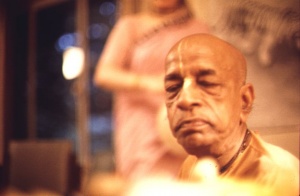CC Antya 12.108 (1975)

A.C. Bhaktivedanta Swami Prabhupada
Below is the 1996 edition text, ready to be substituted with the 1975 one using the compile form.
TEXT 108
- prabhu kahe,—“sannyāsīra nāhi taile adhikāra
- tāhāte sugandhi taila,—parama dhikkāra!
SYNONYMS
prabhu kahe—Śrī Caitanya Mahāprabhu replied; sannyāsīra—for a sannyāsī; nāhi—there is not; taile—with oil; adhikāra—use; tāhāte—over and above this; su-gandhi taila—perfumed oil; parama dhik-kāra—immediately to be rejected.
TRANSLATION
The Lord replied, “A sannyāsī has no use for oil, especially perfumed oil such as this. Take it out immediately.”
PURPORT
According to Raghunandana Bhaṭṭācārya, the spokesman for the smārta regulative principles:
- prātaḥ-snāne vrate śrāddhe dvādaśyāṁ grahaṇe tathā
- madya-lepa-samaṁ tailaṁ tasmāt tailaṁ vivarjayet
“One who smears oil on his body while observing a vow in conjunction with a ritual, while bathing in the morning, while performing the śrāddha ceremony, or on dvādaśī day may as well pour wine over his body. Therefore, oil should be rejected.” This word vrata (vow) is sometimes understood to refer to the sannyāsa-vrata. Raghunandana Bhaṭṭācārya has also said in his book Tithi-tattva:
- ghṛtaṁ ca sārṣapaṁ tailaṁ yat tailaṁ puṣpa-vāsitam
- aduṣṭaṁ pakva-tailaṁ ca tailābhyaṅge ca nityaśaḥ
This means that clarified butter (ghee), mustard oil, floral oil and boiled oil may be used only by gṛhasthas, householders.